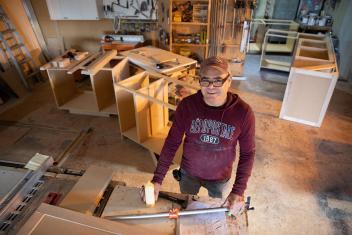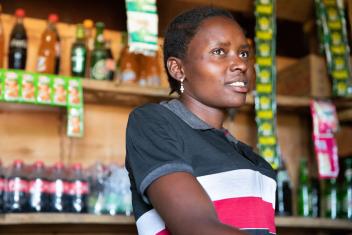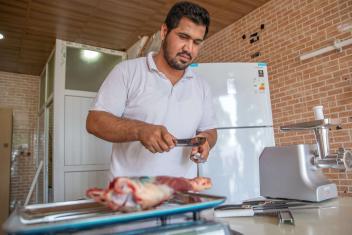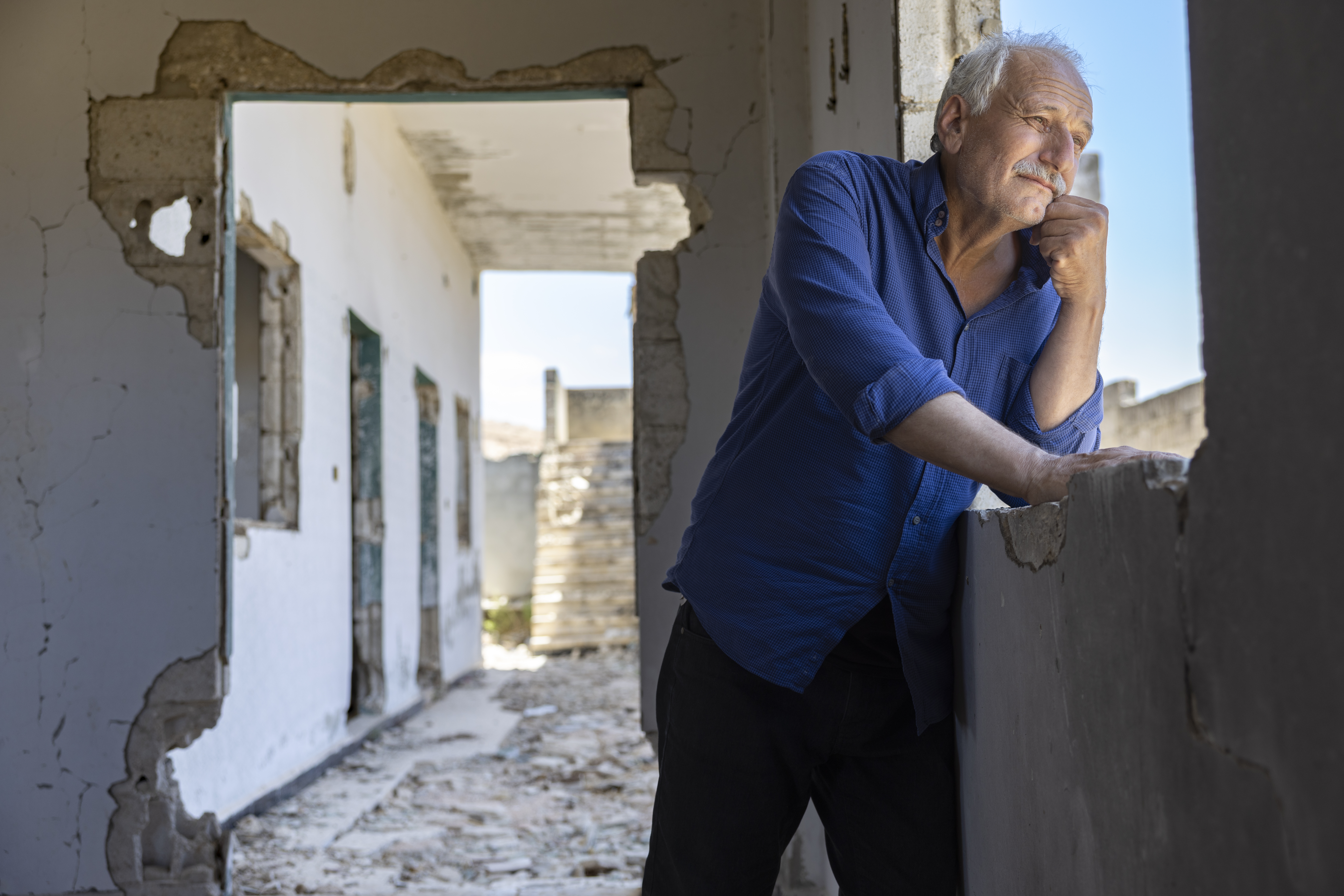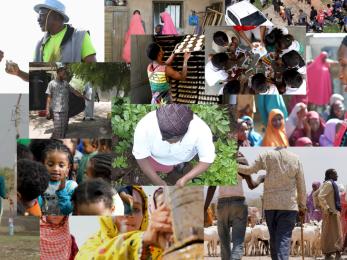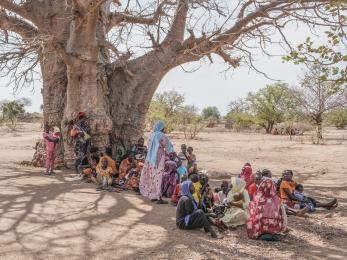2021: A year of recovery and resilience
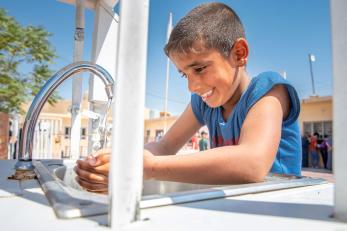
With a new year on the horizon, we’re reflecting on the challenges, opportunities, and progress in the communities we supported in 2021. From providing clean water to distributing small business grants, our priorities have been to help people recover and build resilience in the second year of a global health crisis. Many of the communities we support have been facing challenges like climate change, natural disasters, hunger, and conflict. COVID‑19 made it more difficult to rebuild lives and livelihoods—but it isn’t impossible. Our teams adapted quickly, worked harder, and reached over 50 million people in more than 40 countries to meet urgent needs, support sustainable livelihoods, and build stronger communities.
-
28.7m
-
50m
-
40+
-
320+
As we confronted unequal COVID‑19 vaccine distribution across the world—low-income countries are waiting at the back of the line to receive doses—we continued to advocate for more equitable vaccine allocation while delivering prevention campaigns, which included distributing hygiene kits and raising awareness. This year, we reached more than 28 million people with our COVID‑19 response.
Even though the pandemic has made all aspects of life more complicated, it hasn’t kept us from providing emergency support when earthquakes, floods, and a volcanic eruption left families without homes and basic services in places like Indonesia and Haiti to Nepal and the Democratic Republic of Congo. In 2021, it would have been understandable for our participants to feel overwhelmed and unable to tackle obstacles that are out of their control. But it is their fortitude and insights that drives our collaborations and informs how we can best support their communities today, tomorrow, and for many years to come. Now, we’re looking back at how we’ve reached and supported communities in recovery and resilience.
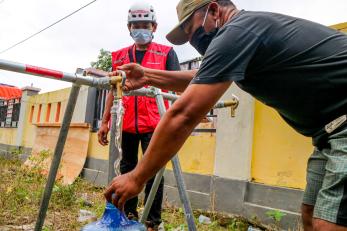
Providing access to clean and safe water
In moments of crisis like natural disasters, conflict, and displacement, our Water, Sanitation, and Hygiene (WASH) team’s priority is to provide communities with the basic necessity of water and sanitation. After tropical storms Eta and Iota hit Guatemala, we reached nearly 100 communities—made up of 40,000 people—with supplies for preventing the spread of COVID‑19 at the beginning of the year. We restored storm-damaged water systems and set up handwashing stations in high traffic locations. We partnered with radio operators and the telephone company to raise awareness about COVID‑19 prevention, reaching more than 1.2 million people with information on how to keep themselves safe during a challenging time.
Our WASH programmes are more important than ever to help communities recover and rebuild during the pandemic. In Iraq’s Debaga camp for internally displaced people, where families live in close quarters with one another, our WASH COVID‑19 prevention campaigns have provided hygiene kits and raised awareness. We are the sole provider of water and sanitation services to the 7,400 people in the camp, delivering clean and safe water for families whose lives have been uprooted. Outside of the camp, and across the country, the WASH team has restored water connections, rehabbed community water treatment plants, and provided garbage collection to reach more than 700,000 people.
By providing essential support—often during critical times—our WASH teams alleviate a big stressor while helping communities remain healthy.
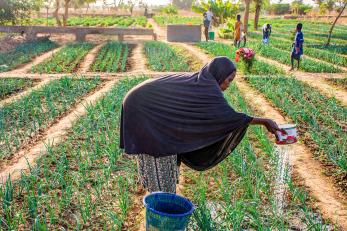
Strengthening food security
For more than a decade, conflict with Boko Haram has devastated food security in Northeast Nigeria where people are repeatedly displaced, unable to farm due to persistent violence, and their local economies are severely disrupted. Communities in this area experienced food insecurity and malnutrition. A lack of nutritious food wreaks havoc on families, causing a lifetime of challenges. In order to help communities create sustainable food security, our Nigeria team reached women farmers through a programme where families could earn income from backyard poultry. Not only did we reach 2,000 mostly female-headed families to strengthen their food security, they boosted their income from the poultry—profit margins for most participants were more than 50%.
In cases where the need was more urgent, our team in Nigeria supported conflict-affected people by distributing vouchers for staple and fresh foods, giving families the flexibility to choose what food items made the most sense for them—while also providing information about the most nutritious foods that would fit their preferences.
In Nepal, our team implemented a similar programme in the plains region when a survey revealed that during COVID‑19 lockdowns, 79% of low-income families lost their daily wages and were unable to meet their basic needs, and 78% had to reduce how much they ate for at least a week. Through a partnership with a national bank, we provided more than 10,000 families with easy-to-use digital vouchers for food and other essentials. The vouchers allowed people to purchase whatever they needed, including medicine, clothes, supplies, and food. When we provide food security and nutrition as part of our programming, we strengthen the foundation of well-being upon which people can build secure, productive, and just communities.
Supporting sustainable livelihoods
Economies around the world were destabilised by the COVID‑19 pandemic. As wealthier countries and big corporations started recovering, small businesses and everyday workers who have no safety nets struggled to rebuild their livelihoods. In some of the countries where we work, crises like conflict and climate change exacerbated existing economic hardships. In Yemen, COVID‑19 and conflict threatened to put viable small businesses out of work. In order to support their livelihoods, our team provided 200 small businesses with cash grants, business training, and mentorship to keep their businesses up and running. From restocking shelves to replacing equipment and tools lost during conflict, the small business grants kept them afloat.
For refugees, finding and securing opportunities is even more difficult. About 1.4 million refugees live in Uganda, representing approximately 3.6% of the country’s population, making Uganda the second-largest refugee-hosting country in the world. The refugees in Uganda—with an unemployment rate of 64%—face significant barriers to finding stable livelihoods. Our team in Uganda needed to come up with an innovative solution for a seemingly intractable situation. In partnership with a local organisation, the Uganda team recently launched a digital platform called Ichuzz2work to help refugees and youth in informal settlements in Kampala find job opportunities. The free platform uses georeferencing, helping workers to quickly find opportunities within a 20 kilometer radius and earn more competitive wages. More than 800 job seekers have enrolled with Ichuzz2work, to find work, learning opportunities, and apprenticeships.
Helping business owners and people build sustainable livelihoods lifts up entire communities, building a stronger tomorrow with freedom to make dignified choices. Poverty rates decrease, families get their basic needs met, and local economies begin to grow.
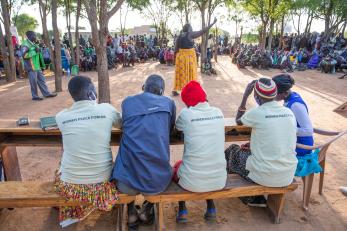
Facilitating peace and stability
In order to achieve and sustain progress—economic, public health, food security—many of the communities we work with require peacebuilding and reducing conflict and violence. In our peace and stability programmes, we’ve found that women are imperative to building sustainable peace across communities. By focusing on inclusion, good governance, and justice, women’s influence on peacebuilding goes beyond defining peace as absence of violence. In six states in Nigeria, our team supports 370 women from 36 discussion groups to develop conflict resolution skills that can be applied to their everyday lives. Thirty of the groups have organised their own peace events, reaching more than 1,200 community members, where they share their knowledge in resolving disputes and mitigating conflicts—guiding their communities toward more stability.
Young people also are core participants in our peacebuilding programmes. In Syria, a local partner organisation put together the BINAA project, which means “building the society” or “building relationships” in Arabic. Young women make up half of the 880 participants, from different cultures and backgrounds, who attend the youth club to exchange ideas on rebuilding their society. Programmes like BINAA strengthen social cohesion and peaceful coexistence. When young people are given the tools to build community, they can offer peaceful solutions and hope for the future.
The causes of conflict are complex and interconnected, and so are the solutions. Our programmes build foundations for lasting peace and stability one conversation at a time.
